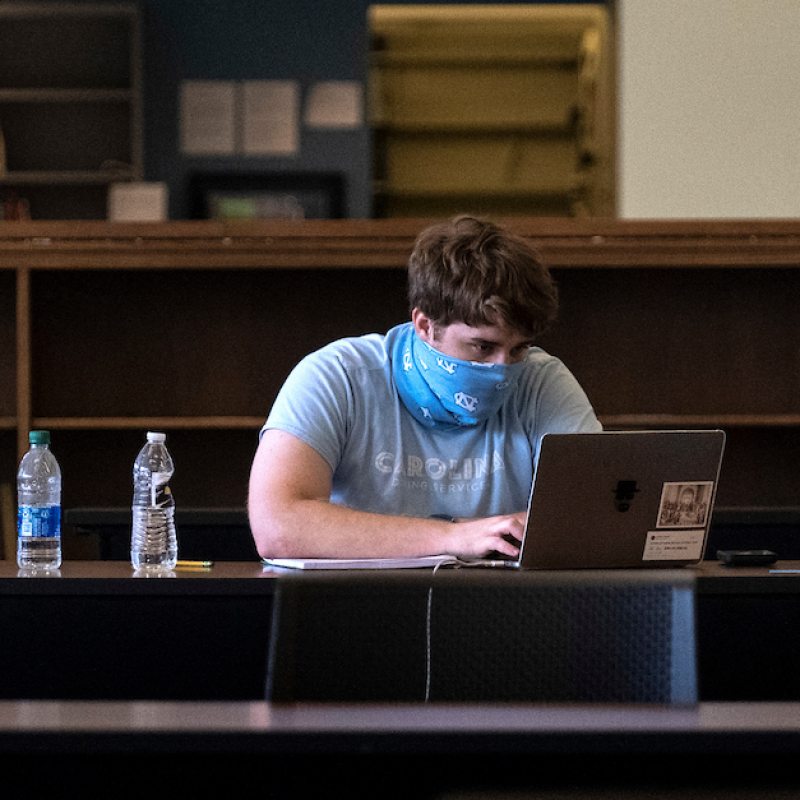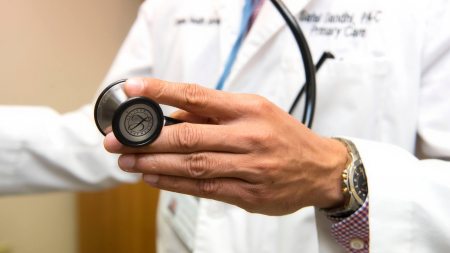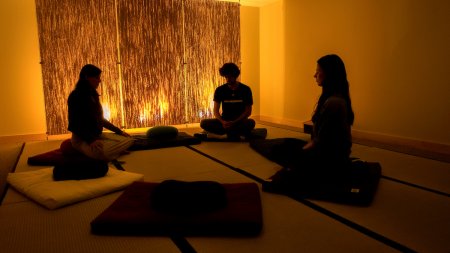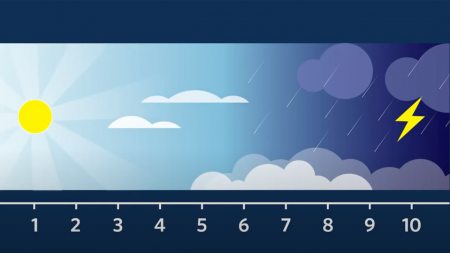Learn more about the Carolina Together Testing ProgramWhen students return to campus, we will provide asymptomatic evaluation testing for students, faculty and staff at three campus locations: The Carolina Union, Rams Head Recreation Center and CURRENT ArtSpace + Studio at Carolina Square on Franklin Street.
Protect our community
The start of the spring semester is almost here, and we are excited for our Tar Heels to begin their classes again. This semester will continue to be different, and we will need everyone’s help to keep our community safe.
Both the Carolina and Chapel Hill communities are counting on each one of us to work together so that our roommates, classmates, professors, coworkers and neighbors can enjoy a successful semester.

CarolinaTogether.unc.edu, the University’s hub for information about life at Carolina during the pandemic, will be updated throughout the semester based on new information from UNC-Chapel Hill’s world-class infectious disease and public health experts, state and local health officials, the UNC System and the valuable feedback from our faculty, students, staff and community.

Carolina Together Testing Program
As part of the University's new robust testing program, all undergraduate students living on campus and the nearby community will be required to participate in regular asymptomatic evaluation testing. Graduate students accessing campus or living with more than 10 people will also participate in regular testing. Testing for other graduate students and for employees working on campus will be available but voluntary.
These evaluation testing locations are intended for asymptomatic testing only. Symptomatic students will continue to be tested at Campus Health. Employees who are experiencing symptoms or believe they have been exposed to COVID-19 should contact the University Employee Occupational Health Clinic.
The tests for asymptomatic students will be self-administered PCR anterior nares nasal swab tests. Tests will be processed at a lab on campus, and results should be available within 48 hours.
This plan is a campus-wide effort developed by faculty and staff who identified UNC-Chapel Hill resources that can be utilized to provide the most efficient and effective testing program possible.
Watch the videos to learn more about the program and testing process
Learn more about the testing procedureUNC-Chapel Hill will use the anterior nares PCR based tests sampling method for testing because it provides the greatest chance of minimizing false-negative results. It is not as invasive as other nasal swabs you may have had or heard about.
Learn more about HallPassHallPass is designed to assist you in the Carolina Together Testing Program. It is a mobile-friendly, web-based application that registers members, informs and reminds them about testing and provides a streamlined interface at the testing location.
COVID-19 Community Standards
Whether you're heading to class or grabbing dinner on Franklin Street, continuing to stick to your Ws — wear, wait and wash — is critical for keeping the community safe.
It will take a commitment by all of us to ensure our success as we respond to the challenge presented during this pandemic. Our COVID-19 Community Standards — wear a mask, remain 6 feet apart, comply with gathering limits, monitor your health daily and participate in the Carolina Together Testing Program — are the individual actions we must all take that, collectively, will help protect the Carolina community.
Wear a mask
Covering your mouth and nose is the single best thing you can do to reduce the viral spread. Masks are a top priority.
All students, faculty, staff and visitors must wear masks on campus and in the community. This includes inside classrooms, public buildings, in common spaces in residence halls and in dining halls, except when you are eating or drinking. You are still required to wear a mask when you are outside, relaxing or walking to classes or between buildings.
Make sure you have a mask with you at all times – toss one in your bag so you always have one nearby. If you do forget, the University will provide one for students, faculty and staff free of charge. If you are able, have a mask for each day of the week. After wearing one, place it in a labeled paper bag for use one week later. CDC research shows the virus will not live on such a surface for a week.
Wait
Practice physical distancing whenever possible. This is another simple way to help prevent the spread of the coronavirus.
Research has shown that transmission of COVID-19 can occur even when individuals are asymptomatic. Keeping space between you and others will reduce your risk of being exposed. Students, staff, faculty and visitors should stay at least 6 feet away from others when possible — inside and outside. If you can’t physically distance, make sure you have a face covering. Wearing a mask while physically distancing is even better.
You should also avoid gathering in large groups and avoid crowded areas.
To help all of our students, faculty and staff physically distance as much as possible, the University has modified campus spaces for students to connect and socialize.
Limit your gatherings
All members of the Carolina community who are attending an event or gathering must wear a mask and must maintain at least 6 feet of physical distance, even when complying with limits for events and gatherings. The most frequent cause of the spread of COVID-19 among members of the University community is individuals participating in events or gatherings.
Events and gatherings are limited to 10 people inside and 25 people outdoors, regardless of location. These restrictions do not apply to classrooms or other campus spaces when used for instructional purposes, research or administrative functions.
Keep an eye on your health
Students who are on-campus, attending in-person classes or coming to campus must monitor their symptoms daily. Undergraduate students studying remotely should also monitor their symptoms daily. If you’re not feeling well, immediately contact Campus Health.
Faculty and staff are also expected to monitor their symptoms daily before reporting to work on campus.
For the COVID-19 Community Standards symptom list, visit Carolina Together.
Student health resources
Campus Health
Campus Health provides a full spectrum of expert, patient-centered and inclusive ambulatory primary medical care for students, including a full-service radiology, physical therapy and pharmacy service.
Student Wellness
Student Wellness works to enhance the individual and collective health of our campus through a wide range of programs, services and resources.
Counseling and Psychological Services
Carolina's Counseling and Psychological Services is strongly committed to addressing the mental health needs of the student body through timely access to consultation and connection to clinically appropriate services.
Caring for your mental health by monitoring stressors
Understanding the daily stress continuum and tracking where you fall on the continuum is crucial to caring for your mental health. Healthy Heels provides some coping ideas for those days when your stress level climbs the scale.



